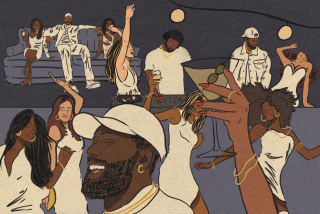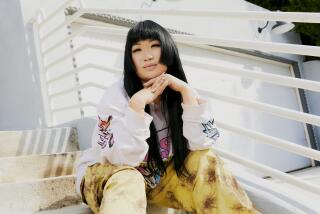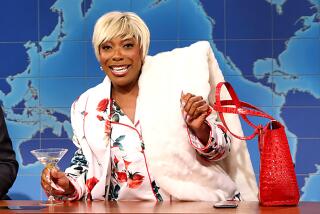Q&A: ‘Misadventures of Awkward Black Girl’ puts Issa Rae in a cool position
Issa Rae knows all about the perks of being awkward.
Since the 2011 launch of “The Misadventures of Awkward Black Girl,” the popular YouTube Web series that Rae created in which she plays a twentysomething navigating comically uncomfortable situations on the job and in her personal life, the 29-year-old actress and writer has made embarrassing the new cool. Her videos (including other online projects such as “Roomieloverfriends” and “The Choir”) have amassed more than 25 million views combined.
Rae, who grew up partly in L.A., has attracted the attention of the likes of Pharrell Williams and ABC empress Shonda Rhimes with her strong point of view and sharp voice. She recently launched ColorCreative.tv, which develops and produces video projects by minority writers and is working with Larry Wilmore on a pilot for HBO.
Now she has funneled her sensibility into a funny, honest collection of collection of essays. “The Misadventures of Awkward Black Girl” (Atria/37 INK: 204 pp., $26) tackles subjects including her misadventures in chat rooms as a teenager (“With each swift keystroke, a new, fearless identity emerged”), her parents’ divorce and her feelings about race (“I love being black; that’s not a problem. The problem is that I don’t want to always talk about it...”)
Rae will be signing her book in Los Angeles at The Last Bookstore at 7 p.m. Tuesday and Eso Won Books at 7 p.m. Wednesday.
Has writing a book been something you had your eye on for a while?
It’s something I’ve wanted to do, even as a child. But I sort of put it on the back burner when I started doing videos and writing screenplays. And then I started reading [Mindy Kaling’s] “Is Everyone Hanging Out Without Me?” and was just obsessed with Mindy in general. Around that time people started contacting me about doing my own book. I always thought I would do it in the “Awkward Black Girl” narrative, that it would be a fictional book. But then the offer came to do a series of essays, and I started asking myself if I was really ready. I read Tina Fey’s book, I read Sarah Silverman’s and I started thinking, “Hmm, I think I can do this.”
As a little girl, what did you see yourself writing?
I loved writing stories. My mom used to have one of those old Apple computers, and I would always be on the Word processor all day just making up stuff. One of my first characters I would write stories around was a persona called Cool Girl, which is actually opposite of what I’ve made my brand out of, funny enough. My mom had this Tina Turner-esque wig that was like purple and pink, and I would put it on and transform. It was like my alter ego, and I would write stories about the adventures she had.
How did you decide what topics to cover?
I knew I wanted to showcase a lot of the awkward experiences I’ve encountered in my own life. You always wonder if your writing is interesting enough to make people care. So that was a huge intimidating factor for me. You start second-guessing and then don’t really know what you want to write.
Conversations with Dawn [Davis, her book editor] really helped shape it. When she would ask me questions like, “What was it like in college?” Or, “what were some childhood moments that stand out for whatever reason?” Then trying to figure out how far back I could go, that really helped me. Because a lot of the awkward incidents happened in middle school. I didn’t realize how much of that has shaped who I am now. Even with doing the series of “Awkward Black Girl,” I took a lot of those experiences and just put them in adult situations. I guess the blueprint was just thinking about myself and my family and going from there.
It’s interesting to see your evolution with the Internet, where you started with it (with questionable moments in chat rooms) to it helping to making you a star.
My mom was always just like, “get off the computer!” And now she’s marveling at how far I’ve come with the help of a computer. To her it was always the ultimate source of procrastination, she thought I spent too much time on it. And nobody knew what the Internet was going to be and the potential of it, myself included. But I knew that it really allowed me to create characters, as crazy as it sounds. It was sort of the impetus of me discovering other things like forums and chat rooms and building a community. Had I not started then, I don’t think I would have been as into Facebook and I wouldn’t have built an audience there. It really was a creative genesis for me.
What had you set out to create with “Awkward Black Girl”?
When I came up with “I’m awkward and I’m black,” I thought it was a brand. I thought I was just going to be creating T-shirts. I was very limited in my view as far as the scope of it. ... I’d like to say I had the foresight to know it was something, but I didn’t have the foresight to know how many people would identify with it.
You’re working on some TV pilots now. And previously you had something in the works with Shonda Rhimes that ABC ultimately passed on. What have you learned about what goes on in making traditional TV?
So many things. They taught me so much just about the television process. That was my very first experience, and to be under Shonda and Betsy [Beers] was the ultimate learning experience because, hello, they’re killing it. I learned about the studio and network system, how much money goes into making shows, how long it takes, how much ownership is important.
Now I realize that in developing that show that I had the initial idea for, I don’t have it anymore. I don’t own it anymore. You sell your ideas away, and that’s it. Luckily with “Awkward Black Girl,” since I created it first, I’m always going to own that. That whole process made me realize I want to own all my ideas, I don’t want to just get paid for people to sit on something.
It also taught me ... I mean, I knew it was an exclusive process, but it’s also still a very white process, even though my situation was very diverse. I was surrounded by women of all colors, and that was great, but I realized that is not the norm. But it made me realize I want to change that. That’s part of what ColorCreative is, and producing other pilots from diverse people. Any shows that I work on will be diverse.
You’ve also been working on an HBO series with Larry Wilmore. What can you say about the status of that?
I don’t know how much I can talk about it. Things are moving. I’m happy. Larry is the best man ever. Yeah, even notes that they’ve given me have only been to make it better. I really, really appreciate the process. [HBO has now greenlighted Rae to produce a pilot for her half-hour comedy series with Wilmore, “Insecure.”]
And don’t think I’m not going to ask about what that selfie with Oprah was about. Tell me she’s asking you to do something for OWN.
It was the holy grail to meet her. I realized the magnitude, but at the same time I didn’t realize the magnitude because I was in the photo. Then I saw the reactions, and I was like, wow, she really is the be all, end all. ... But it was a great meeting, great experience. She’s a force.
In the book, you talk a lot about the TV you watched growing up. How was that a springboard?
I think it’s really important to see yourself on television. Growing up in the ‘90s and seeing myself on TV [in black characters on shows such as “A Different World” and “Living Single”] taught me to expect to see myself. But there were so many more examples then. To have that taken away and to see what those images were replaced with, that’s just so damaging. I imagine kids growing up in this millennium not even knowing what that’s like — never having experienced it — and that’s absurd to me. That fuels, again, why I want to create what I want to create.
Even with shows now — of course, Shondaland is killing it, and they’re a great example, but I feel like networks right now aren’t saying, “Oh, look at all [that] wholesome content for people of color. That’s what we’ll we want to continue to produce.” They’re saying, “Oh, shoot, Shonda and a black lead, they’re making money, let’s try to emulate it.” It doesn’t feel like we’re trying to change race relations. I mean, “Empire” isn’t going to change race relations. It’s not going to encourage younger kids down the line. But it’s a step in the right direction. It’s providing some sort of balance. I think there’s a long way to go. I still think we have to have creators of color, showrunners of color, more executives of color. That’s when varied experiences will make their way to the screen.
What’s your advice for young people hoping to be the ones to help spur that change?
There’s YouTube. And Vine really helped to level the playing field. There’s always going to be a new platform to showcase your work and talent. That’s a start. But collaborating with people is so important. Patience is key. A lot of people think they are going to have overnight success. That is just not the case. I always tell people, I’ve been doing this since 2006. My first popular Web series wasn’t until 2011, my third time trying it. So it’s a process and it requires patience.
Cosmopolitan recently ran and adapted one of the essays in your book that talked about your frustrations with having to prove your blackness. The piece got a lot of attention.
I wrote part of that piece like three years ago. Then I re-purposed it and added more for the book. When Cosmo said they wanted to print it, I was like, “Oh, that’s great.” I was like, “when?” They said February, which is Black History Month. So I was like, “arrgh.”
Re-reading that piece, it talks about my conflicting feelings with my public blackness. That’s something that’s personal. It was almost like a diary entry. Since I wrote that piece, a lot has changed. Ferguson happened, Mike Brown happened. There’s so much that has happened in terms of race relations in America. ... I didn’t like the headline. It was something like, ‘Can we not talk about my race?” Vibe retweeted it saying I didn’t want to talk about race.
Hello, I will never not be able to talk about race. I can never not be black. But I can always feel like I don’t want to talk about it. I don’t want to be in a position where I have to defend the piece. But it is what it is. I go back and forth, and I’m allowed to do that.
More to Read
Sign up for our Book Club newsletter
Get the latest news, events and more from the Los Angeles Times Book Club, and help us get L.A. reading and talking.
You may occasionally receive promotional content from the Los Angeles Times.







